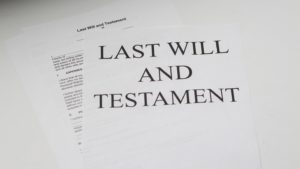6 ESTATE PLANNING MISTAKES AND HOW TO AVOID THEM
 Estate planning is a process that allows you to state how you want your personal and financial assets to be distributed at your death and plan for incapacity. By being proactive, you have control instead of other people or legal rules making those decisions. As you begin (or update) your own estate planning, here are some common mistakes and strategies to help you avoid them.
Estate planning is a process that allows you to state how you want your personal and financial assets to be distributed at your death and plan for incapacity. By being proactive, you have control instead of other people or legal rules making those decisions. As you begin (or update) your own estate planning, here are some common mistakes and strategies to help you avoid them.
Mistake # 1: Lack of knowledge about your finances. You cannot properly draft and execute your estate plan if you do not understand what assets and liabilities you have and where they are held. Furthermore, your spouse and possibly other heirs should have this information so they can take over for you when needed.
Strategies: It is important to take an active role in educating yourself about money and managing your finances. Create a detailed inventory of your assets and understand how those assets are managed, by whom, and what happens to them upon the death of you or your spouse. Depending on your situation, you may need a tax advisor, financial planner, or estate planning attorney to assist you.
Mistake # 2: Failing to get life, disability, and long-term care insurance. You never know when a crisis can happen, whether it is an accident, illness, or death. Your biggest asset is your ability to provide for yourself. For primary breadwinners, consider what will happen to you and those you support or want to provide for if you are unable to earn anything.
Strategies: Make sure you have enough insurance coverage to support your financial needs in case you are unable to earn enough income on your own. Also, consider purchasing life insurance to cover any final expenses or estate taxes that might be due at death.
Mistake # 3: Only planning for death, not disability. Advance directives (i.e., Power of Attorney, Health Care Proxy, and Living Will) allow you to stipulate your wishes and designate who can make decisions for you if you are incapacitated. Without these documents, your family must go to court to get someone appointed, which is added time, money and stress. You may also have a stranger making decisions for you particularly if you have no spouse or children.
Strategies: Speak with an attorney about documenting your wishes. You will need to appoint agents to handle health and financial issues on your behalf so consider who you trust to take on this role. You can limit an agent’s powers as needed. Also remember to name successor agents in the event your first pick is unable to serve.
Mistake #4: Believing you don’t need a Will. Some people assume that a surviving spouse will automatically receive everything so there is no need for a will. However, if you die without a will in New York and you are survived by a spouse and children, with respect to assets left in your own individual name, your spouse gets the first $50,000 of your assets and the balance gets divided equally between your spouse and children.
Strategies: An attorney can help you draft a will and other documents that reflect your wishes, including instructions for distributing your property; naming guardians and trustees; and safeguarding assets for minor children, children from a prior marriage, and children with special needs. Note that if you are separated or recently divorced, there are additional reasons to draft a will and other estate planning documents to limit your ex-spouse’s rights.
Mistake #5: Misunderstanding probate vs. non-probate assets. Probate only applies to assets in your individual name at the time of your death. Non-probate assets are assets that pass by operation of law automatically on a person’s death, such as joint, in trust for and pay on death accounts; life insurance policies; and retirement and annuity accounts with a named beneficiary. When people don’t understand the difference, their estate may not be distributed as they had hoped. For example, a will may direct that your assets be shared equally by all your children, but if you named one of your children as beneficiary on an insurance policy or financial account, that child may end up with a larger share of your estate.
Strategies: It is important that your beneficiary designations are coordinated with your will and other documents to ensure your wishes are implemented accurately. Your beneficiary accounts must be titled correctly and name successor or contingent beneficiaries. In addition, you should regularly review and update your designations.
Mistake #6: Forgetting to update your estate plan. Your family, finances, and laws may change over time and failing to update your estate plan can result in serious unintended consequences.
Strategies: Review your plans at least every three years, as well as whenever you face one of the five D’s: Death (of your spouse or a potential heir), Disability (yours or an heir’s), Divorce (yours or an heir’s), Distance (you moved to another state/country), and Descendants (births and adoptions).
No one is invincible so start your planning now. Failing to plan is planning to fail!
If you need assistance with your estate planning, contact us for a consultation.
Also check out our related post – It’s Time To Review Your Estate Plan: 4 Questions You Must Consider In The New Year.
